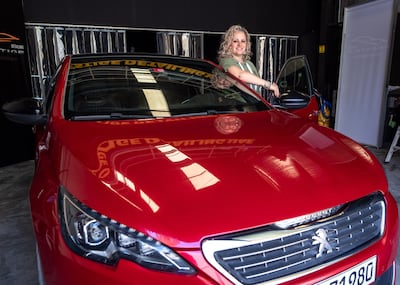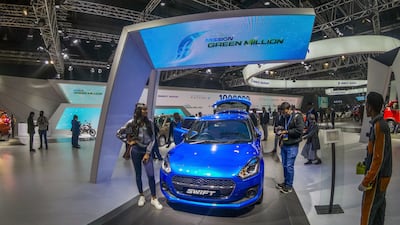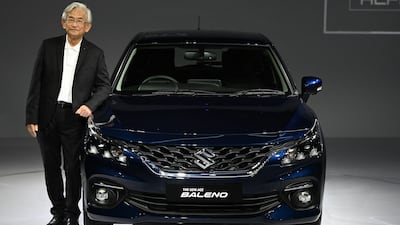A version of this article first appeared in March 2022
Gas-guzzling SUVs and large saloon cars are so synonymous with travel here that it is hard to imagine a time when they will never be popular.
But the recent rise in fuel prices - diesel, Special and Super will be above Dh4 per litre in June - has led to some drivers to think about going green.
Even before prices rose, a sense of personal responsibility for the environment made smaller cars and increasingly reliable hybrid and electric models more attractive.
Trina Mole, who lives in Dubai, ditched her ageing Dodge Nitro towards the end of last year because it was costing too much to fill up.
“I have been using a Peugeot 306 for day to day driving for the past six months because it was costing me Dh220 to fill the Dodge — when 10 years ago you could fill it for under Dh100,” said Ms Mole, 44, from the UK, who owns a pet supply store.
Drive Ninja
“We prefer to drive bigger cars because they offer more safety.
“But we are being pushed to drive smaller fuel-efficient cars because of the fuel prices.”
Christopher Creek, 53, who lives in Abu Dhabi, drove a Jeep Grand Cherokee but downsized to save on fuel costs.
He has since been driving a Nissan Micra for the past 18 months, saving himself Dh500 a month in the process.
“I switched because of the overall ease of leasing a car, including the lower fuel costs,” said the aircraft engineer, from the UK.

“It costs about Dh100 to fill the Micra from empty and it lasts me the entire week.”
Maria Sobh, 26, sold her Jeep after she realised she spent more than Dh1,300 in fuel per month.
“When I was living in Abu Dhabi I was not driving as much because I lived close to my work,” said Ms Sobh, a Lebanese-Canadian who works in the sustainability sector.
“I used to be able to get two weeks out of my full tank, now I’m lucky if I get two days in Dubai.”
Ms Sobh said she decided to put her jeep up for sale and buy a Dh175,000 Tesla instead.
“I bought my Jeep for Dh160,000 four months ago but I know I will save the extra money in fuel costs by switching to an electric car,” she said.
One expert said the rising fuel prices would inevitably lead to an increase in motorists considering more cost-effective options in the future.
“I think we are going to see a gradual shift where value for money becomes more of a factor when buying a car here in the UAE,” said Adam Whitnall, chief executive of car comparison site Drive Ninja.
“We’ve already seen it in overseas markets where huge fuel prices heavily dictate which types of cars people buy.
“I expect it’s going to translate to a bigger long-term shift here as well.”

The most likely shift will involve cost-conscious motorists exploring hybrid options as well as downsizing their SUVs to more fuel-efficient models, he said.
“Nobody would have walked into a car showroom 10 years ago and asked questions about how fuel-efficient a vehicle was here,” said Mr Whitnall.
“We’re starting to see that happen and the latest changes to petrol prices mean people are more interested than ever in how fuel-efficient a vehicle is.
“There’s a lot of interest in hybrid vehicles at the moment as well as smaller SUVs.”
Big SUVs will keep their appeal
Does this mean the days of the Nissan Patrols and Toyota Land Cruisers are numbered? Not necessarily, said Mr Whitnall.
“I don’t think you’re going to see much of a change there as that end of the market tends to be around Dh200,000 to 300,000,” he said.
“The people who can afford to drive those are unlikely to be worried about how much petrol costs, they are not a price-sensitive demographic.”
The continuing rise in fuel costs has led to more interest in electric vehicles (EVs), but there are several problems that need solving before they are widely adopted in the region.
“The average EV is still significantly more expensive than the average car with an internal combustion engine,” said Mr Whitnall.
“The additional cost of an EV right now is so high that you would be better off paying for a petrol car, as you still wouldn’t make up the difference in fuel cost savings.”
Part of the reason for the price discrepancy between EVs and their petrol alternatives is that many car companies make money from repairs, he said.
“EVs don’t require as much repairs and most dealerships make a lot of money on maintenance and servicing,” said Mr Whitnall.
“That’s one of the reasons they charge so much more for the initial price of the car.”
He said the adoption of government subsidies for the purchasing of EVs, which are common in other countries, could make motorists much more likely to buy.
Electric cars still too expensive for many
One Dubai resident said she was keen to buy an EV but simply could justify spending that much money on a car right now.
“My husband and I looked at buying an electric model of a Hyundai recently but it was Dh100,000 more than the petrol equivalent,” said Jane Barker, 42, who is the head of Business and Economics at Kent College.
“We want to switch from a petrol car for environmental purposes and it seems inevitable fuel prices will continue to rise.
“We will have to wait though until EVs become more affordable.”
Industry says 'electric is inevitable'
Mark Jenkins, chief executive of the Al Ghandi Auto Group, which sells Chevrolet, GMC and Cadillac vehicles, among other brands, said it was inevitable EVs, hybrid vehicles and more fuel-efficient cars would become more widely adopted.
“In the long run we believe that a majority of the car owners will opt for these options as they are not just environmentally friendly but will save drivers costs not just with fuel, but regular maintenance as well,” he said.
Another expert said decisions on buying a new car were often made without worrying about the cost of fuel, something that was becoming less common.
“Historically in the UAE, relatively low petrol prices have allowed consumers to focus on vehicle prices, performance, comfort, and style,” said Ben Barber, managing director of car service company XA Group.
“However, in the current climate, cars with higher fuel efficiency and lower maintenance costs will gain relatively higher traction among buyers.”











